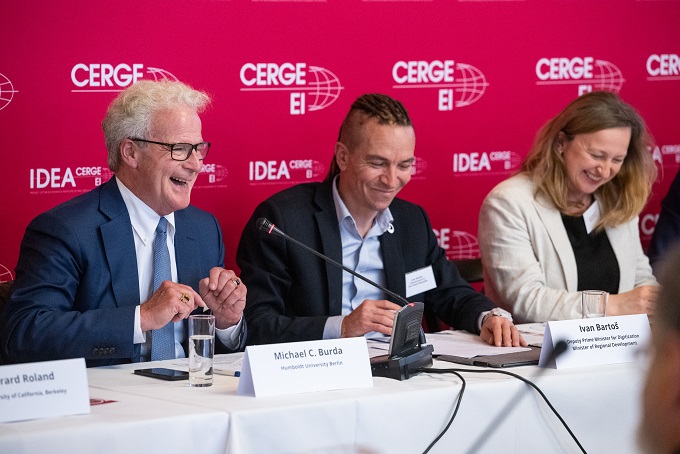News
High Energy Prices and High Levels of Regulation Threaten European Growth
3 June, 2024
The CERGE-EI Executive and Supervisory Committee held a roundtable debate on "Current Challenges for Czech Economic Policy in the Context of the Expected Economic Performance of the EU and the US after the Elections" on May 31.
The debate featured presentations by the Minister of Regional Development Ivan Bartoš, the Minister of European Affairs Martin Dvořák, the Minister of Transport Martin Kupka, and representatives of the economic academia - Jaroslav Borovička from New York University, Michael C. Burda from Humboldt University in Berlin, Henry Farber from Princeton University, Filip Matějka from CERGE-EI, Gerard Roland from the University of California at Berkeley, Christopher Sims (Nobel Laureate, Princeton University), and Czech National Bank Deputy Governor Eva Zamrazilová. The main host and co-moderator of the debate was Prof. Jan Švejnar as one of the founders of CERGE-EI.

The discussion was followed by eighty Czech academics, managers, and business and diplomatic representatives. "We debated mainly the global economic challenges facing the Czech Republic and the world, firstly the elections to the European Parliament and later the election of the new US President. Both of these events will undoubtedly affect not only political but above all economic and economic development on the planet. Thanks to our guests, we have outlined at least a partial view of what awaits us and what we must prepare for," said Jan Švejnar.

Discussants agreed that the European economy is currently threatened by high energy prices, which are behind the departure of energy-intensive industries to regions with lower prices. The same influence is behind the outflow of investment from the continent. The panelists identified the rise of populism resulting from the dissatisfaction of the population and the high level of regulation and bureaucracy as further threats. Governments should also concentrate on a few key objectives and not fragment their efforts into a multitude of partial, narrowly focused programs. The roundtable participants also identified the potentially highly protectionist US policy as a potential threat, which could endanger, for example, the European car industry. Representatives of the Czech government quoted, for example, insufficient investment in infrastructure and education as a significant negative influence. They also pointed out that the convergence of the Czech economy with Western Europe has stalled. The absence of the euro was identified as a possible risk factor for the Czech economy; according to one view, this would provide access to more affordable credit financing.

Investment in research and development and support for its spending by private companies was identified by the debaters as a condition for future prosperity. Europe should invest in new technologies, such as AI, and be attractive to foreign investment in this area. At the same time, investment in education is necessary to avoid wasting talent. Reducing bureaucracy was identified as another condition for sustaining economic performance. In the economists' opinion, the Czech economy would also benefit from the adoption of the euro, which has proved its viability over the decades even in difficult conditions.









